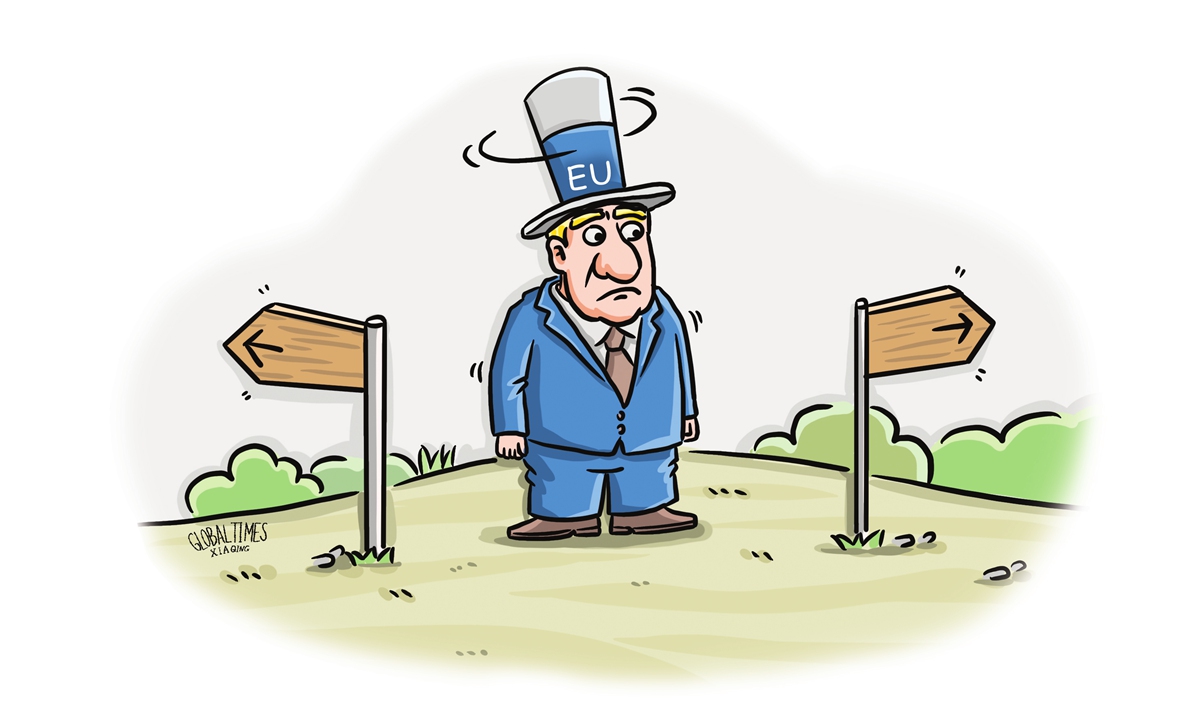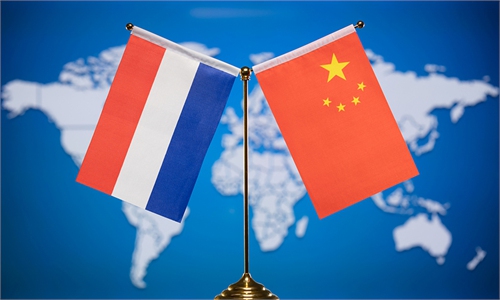
Illustration: Xia Qing/ GT
The recently concluded Dutch parliamentary elections witnessed a significant victory for the far-right political figure Geert Wilders and his Party for Freedom (PVV), winning 37 seats out of 150 seats.In the increasingly fragmented Dutch political landscape, the PVV's notable success is expected to have seismic implications for the future political scenario in the Netherlands. Wilders' PVV is likely to form a coalition government with other parties, with Wilders himself having a high probability of becoming the next prime minister of the Netherlands.
It is anticipated that a future Dutch government dominated by far-right political forces will exert a considerable impact to the unity within the EU. The core demand of the PVV is to hold a nationwide referendum on the Netherlands' EU withdrawal. The victory of the far-right political party in this election serves as a strong demonstration effect for upcoming elections in other Central European countries. If these far-right forces gain support from EU member states with strategic autonomy, it will inevitably exert a certain impact on the EU's internal decision-making mechanisms. This influence will also affect the EU's political stance on issues such as institutional reform, external trade policies, climate governance and the Ukraine crisis, compelling the bloc to make adjustments to maintain internal unity.
In addition, the political stance on immigration issues of the PVV, set to become the largest party in the Dutch parliament, poses a risk of intensifying internal ethnic conflicts within Dutch society. A populist view popular in the Netherlands argues that migrants have caused severe social and livelihood problems in society. Even if the future Wilders cabinet includes moderate parties with differing views, the trend toward a more radical conservative cultural policy in the Netherlands is unlikely to change.
The political stance of European far-right parties on the Russia-Ukraine conflict will further stimulate the EU's internal desire for a peaceful resolution to the conflict. The PVV led by Wilders openly opposes the EU's current attitude toward Russia. "Do not let Dutch households pay the price for a war that is not ours," Wilders once commented. The EU has incurred significant social costs in the Russia-Ukraine conflict, and internal contradictions within Europe regarding how to address this conflict have become increasingly apparent. The increasingly influential far-right political forces will undoubtedly have a significant impact on the EU's future unified policy toward the Russia-Ukraine conflict.
The rise of far-right political parties from the political fringe to the center stage in Dutch politics vividly reflects the Dutch people's increasingly strong opposition to the existing social mechanisms. The PVV has expressed strong criticism of the Dutch political establishment, and its campaign issues related to social livelihood problems have resonated with a broader audience, bringing many new perspectives to Dutch politics. In a survey in September by Ipsos, a pollster, just 33 percent of the Dutch public said they had confidence in politics, and a whopping 72 percent thought the country was heading in the wrong direction. In response to widespread public dissatisfaction, Wilders openly declared that there is a ruling elite of parliamentarians who only care about their own careers and ignore the will of the people. He also argued that the Dutch multi-party coalition government lacked clear and effective policies. These political statements garnered significant support from voters.
The changes in European politics concentrate on the social governance crisis diffused in the current political landscape in Europe and profoundly reflect the widespread dissatisfaction of EU member states with the prevailing political culture in Europe. Amid the fragmentation of the Netherlands' politics, multi-party coalition governments are unable to effectively address social livelihood issues. While a significant migrant population has made tangible contributions to the Dutch economy, inherent differences and exclusion based on religious and cultural beliefs have prevented the formation of an internally unified community of shared ethnocultural future in the Netherlands.
Fundamentally, this social and cultural model stems from the inherent spiritual values of modern capitalist civilization in the West, emphasizing self-interest principles and confrontational cultural consciousness. These values dominate the basic patterns and value orientations of Dutch social development and ultimately become the breeding ground for far-right political ideological trends. The crisis in Dutch social governance is also a microcosm of the EU governance model. If Europe continues to linger in the ideological constraints of the Cold War, disregarding the objective reality and basic rules of current world political development, the EU may face even more severe political challenges.
The author is an associate professor of the School of Language and Culture at Shanghai University of Political Science and Law. opinion@globaltimes.com.cn


